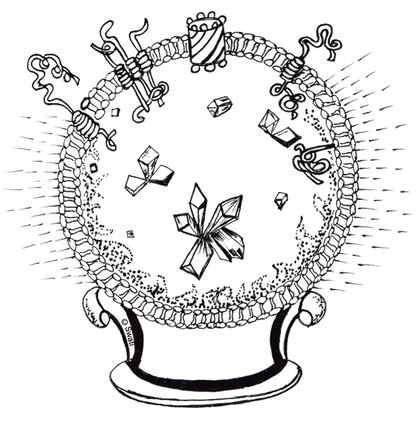Great response to second workshop on Membrane Proteins
In December 2021, the Membrane Proteins Working group held their second workshop, following up on the very successful one in May with more than 200 participants from a range of disciplines. The topics for the winter workshop was related to “Structural Resolution of Membrane Proteins: From Sample Preparation to Structural Resolution”.
In the first online workshop in May 2021, several aspects of expression systems, protein purification, membrane solubilization and other preparation methods were discussed. In December more topics were covered such as multi-protein complexes, detergent trials and crystallization strategies such as LCP and Hi-LIDE.
Erika Tóth, coordinator of the Membrane Protein workshops.
“In addition, we had also invited scientists to introduce their best practices on Cryo-EM and neutron structures, scattering techniques, and data collection and processing, says Erika Tóth, postdoc at Lund University and coordinator of the workshops. “The production of high-quality membrane protein crystals is always very challenging. We were able to cover many steps of the processes and get good advice on how to figure out the best way to prepare samples, which methods to use, understand more about data models and new software as well as how to conduct experiments at MAX IV.
New techniques and hot topics
The range of participants from PhD students to senior researchers was valuable. The younger researchers could talk in more detail about technical aspects from their lab work which many found very useful. The senior researchers contributed with perspectives on what they see ahead from decades of experience in the field.
“We had really good discussions and got a broad overview of new techniques and hot topics. In this field negative results do not get published and that can lead to that people might try to the same things. With this kind of open sharing, we can learn also what does not work so well. Everyone gets stuck somewhere in this pipeline”, explains Erika Tóth.
The workshop offered both longer keynote presentations and smaller talks, promoting interaction and Q&A sessions. Speakers included Maria Marta Garcia Alai and Christian Löw from EMBL, Hamburg, Petra Fromme, Arizona State University, Gisela Bränden, University of Gothenburg, Allesandra Luchini, PSI and Erik Lindahl, Stockholm University.
Valuable knowledge exchange
An important part was to connect people and although the ambition was to hold a hybrid meeting, it had to be an online event in the end as the omicron version of the corona virus was spreading everywhere. On the positive side it made it easy for a broad international participation and speakers from the US to join over the two-day schedule.
“People really wanted to reach out, to be able to share data and find potential collaborations. Many have overlapping study subjects and can benefit from different approaches and methods to try. For those who are new to the field this kind of opportunity is very useful. We hosted a friendly environment where you could ask any questions you wanted. It was two days of really good networking opportunities, concludes Erika Tóth.


